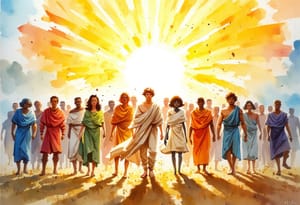| Series | 2. Reading from Colossians |
|---|---|
| Theme | 2. Reading from Colossians - Faitauga mai le tusi o Kolose |
| Colour | Lanu Meamata |
| Special Day | Fono – Komiti o A’oga |
Scripture Focus: Kolose 3:5-11
Put to death therefore your members which are on the earth: sexual immorality, uncleanness, depraved passion, evil desire, and covetousness, which is idolatry; for which things’ sake the wrath of God comes on the children of disobedience. You also once walked in those, when you lived in them; but now you also put them all away: anger, wrath, malice, slander, and shameful speaking out of your mouth. Don’t lie to one another, seeing that you have put off the old man with his doings, and have put on the new man, who is being renewed in knowledge after the image of his Creator, where there can’t be Greek and Jew, circumcision and uncircumcision, barbarian, Scythian, bondservant, freeman; but Christ is all, and in all.
- Colossians 3:5-11 (WEB)
Study:
Paul doesn’t mince words. He’s calling for radical change. In verses 5-9, he lists behaviors that are not just *sinful* but are, in fact, akin to worshipping false gods – “covetousness, which is idolatry.” These ‘earthly’ desires aren’t neutral; they draw us away from God and incite His righteous anger. But the beauty of the Gospel isn't just identifying what to *stop* doing. Paul quickly pivots to what we *have* done: we've put off the “old man” – the self consumed by these desires – and put on the “new man.” This new self is being restored to the likeness of our Creator, continually renewed through knowledge of Him. The final verses (10-11) beautifully illustrate the unifying power of Christ. Old distinctions—Greek, Jew, barbarian, slave, free—lose their significance. In Christ, all are one.
Application:
It’s easy to fall into the trap of thinking of faith as merely avoiding certain behaviors. But Paul’s message is much more proactive. It's about intentionally dismantling ingrained patterns of sin *and* actively cultivating a life centered on Christ. This isn't a one-time event, but a continuous process of “putting off” and “putting on.” Recognizing our inherent biases and prejudices, and actively choosing unity in Christ, is a vital application of this passage. Are there areas in your life where you’re still clinging to the “old man?” Where are you still letting earthly desires dictate your actions and thoughts?
Reflection Questions:
- What specific ‘members’ (habits, desires) does this passage challenge you to ‘put to death’?
- How is covetousness, wanting more, a form of idolatry?
- What does it mean to be ‘renewed in knowledge’ of your Creator?
- In what ways do societal distinctions (nationality, social class, etc.) still hinder unity in Christ?
- How can you actively ‘put on’ the new man this week?
Prayer:
Loving Father, thank You for the radical freedom offered through Christ. Help us to diligently examine our hearts, to identify the desires that hold us captive, and to courageously “put to death” those things that grieve Your Spirit. Fill us with Your renewing power, transforming us into the likeness of Your Son, where all divisions are overcome by Your love. In Jesus' name, Amen.
Tags:Colossians, new life, freedom, sin, renewal, unity, Christ, idolatry, transformation, Bible study
